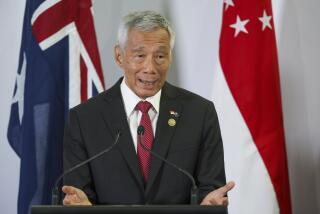Lee Kuan Yew remembered: To many, he was Singapore itself
He was a “lion,” a “leader with an iron fist,” and, to many, he was Singapore itself.
On Monday, flags were lowered to half-staff and a weeklong period of national mourning was declared for Lee Kuan Yew, the formidable and influential former leader widely considered to be the founding father of modern Singapore.
The tributes and condolences that poured in Monday for Lee reflected his complicated legacy as both a hard-charging authoritarian and architect of a miraculous economic transformation that made the city-state into a financial and manufacturing hub.
“To many Singaporeans, and indeed others too, Lee Kuan Yew was Singapore,” said Lee Hsien Loong, Singapore’s prime minister and Lee’s son, addressing the nation in English, Malay and Chinese, and struggling to choke back tears. “He fought for our independence, built a nation where there was none and made us proud to be Singaporeans. We won’t see another man like him.”
Lee’s body will lie in state in Singapore’s Parliament for five days starting Wednesday and a state funeral service is planned for Sunday afternoon.
Memorial boards outside the hospital where he died quickly filled with heartfelt remembrances, balloons, flowers and other trappings of a nation in mourning.
Citizens expressed their sorrow in condolence books provided outside the Istana, Singapore’s official presidential residence, and through Facebook messages and an online message board created by the government.
“A leader with an iron fist, they might say, but if this is what Singapore had to have to become the impeccably clean and efficient city-state it now is, we are more than thankful,” wrote Jeremy Teng in a Facebook post. “As you said, you did your best, and indeed so you did to make Singapore the best it could be.”
“What words can be used to portray the long and arduous journey that he took to help turn a little red dot into one of the most admired countries in the world,” wrote Liew Patrick in one such tribute. “Every breath of fresh air, every drop of water, every morsel of food, every shelter above our heads … carries marks of his effort and contribution.”
The leaders of several Asian countries, many of whom saw Singapore as a model for progress in the region, joined the chorus of tributes Monday.
Indian Prime Minister Narendra Modi called Lee a “farsighted statesman and a lion among leaders,” while Malaysian Prime Minister Najib Razak said that Lee’s “achievements were great, and his legacy is assured.”
In a letter to Singaporean President Tony Tan, Chinese President Xi Jinping called Lee “an old friend of the Chinese people,” the Wall Street Journal reported, and the Chinese premier credited Lee with contributing to “China’s reform and opening up.”
But others alluded to Lee’s reputation as an autocrat and penchant for squelching what he termed “so-called human rights.”
Lee banned chewing gum, kicked out publications that were critical of the government, and paid educated women to have more babies. He also molded the backwater island nation into one of the world’s most efficient and prosperous international business centers.
On Monday, President Obama called Lee a “visionary leader” who was “sometimes uncompromising,” but credited him with the economic leaps Singapore made during his tenure.
Others were more blunt.
“RIP Lee Kuan Yew,” wrote Qin Zhi Lau in a message posted on Twitter. “I admired your tenacity in building [Singapore], but deplored your disregard for freedom of the press and pseudo-eugenics views.”
In a statement Monday, Bob Dietz, coordinator of the Asia Program for the Committee to Protect Journalists, noted Singapore’s reputation as one of the least corrupt countries in the world.
“But without aggressive media coverage, who is watching over the government, other than the government?” Dietz wrote. “As the global plaudits roll in, it is important to remember the relentless string of lawsuits against foreign and domestic media that dared to insinuate any nepotism or misconduct during the Lee family’s rule.”
Economic progress is part of Lee’s legacy, tweeted Phil Robertson of Human Rights Watch, “but so is restricted freedom of expression, self-censorship & stunted multiparty democracy.” Robertson also noted that the Singaporean government had shut down events this week at Speakers’ Corner, a small park area designated as the only location in Singapore where protests can be held.
“It’s a fitting tribute to Lee Kuan Yew’s gagging of free speech that the only place where free speech is permitted in Singapore has been shut down to honor him,” Robertson told The Times in a phone interview.
In a statement, the National Parks Board said the area is “one of the designated community sites for remembering the late Mr. Lee Kuan Yew.”
For more breaking news, follow me @cmaiduc
More to Read
Sign up for Essential California
The most important California stories and recommendations in your inbox every morning.
You may occasionally receive promotional content from the Los Angeles Times.











